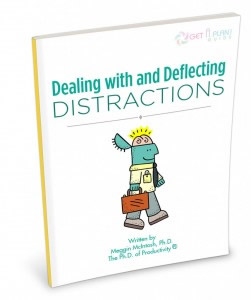Avoiding Self Distraction by Meggin McIntosh, PhD
 Oh, boy. Sometimes we are just our own worst enemies. You have so many projects to complete, and yet things that are seriously low on the priority list get done first. Here are a few ways to avoid distracting yourself as an entrepreneur.
Oh, boy. Sometimes we are just our own worst enemies. You have so many projects to complete, and yet things that are seriously low on the priority list get done first. Here are a few ways to avoid distracting yourself as an entrepreneur.
-
Map out your day as “work” and “other” times. When you’re supposed to be working, you should be working. Imagine yourself as your boss (which, of course, YOU ARE!). Would s/he want to pay you to rearrange the pencils in your top drawer? Would s/he want to pay you to play games on Facebook? Would s/he want to pay you to mess around with your new iPhone, downloading all the cool apps you can find?
-
Plan a few breaks during your day. No one can efficiently sit at a desk for hours on end. Your back, as well as your work, will suffer.
-
Proactively avoid receiving (and making) personal calls during your work time. These often take longer than you imagine.
-
Avoid having too many personal items on/near your desk. The minute you look at that picture of your kitty and think about when she was just a kitten or notice the plants you have that, ‘gosh, just need a little water,’ well, you get the idea. It can go downhill quickly.
-
Have a “random thoughts” pad that is in a prominent place on your desk. As soon as a random thought occurs (e.g., what to pick up for dinner, when to call the dentist for an appointment, etc.) write it down. Then ignore the sheet until the end of the day. Take this sheet home with you and deal with it so these thoughts won’t continue to bug you.
-
At the end of the work day, close it out, i.e., put items (files, sticky notes, pens, notebooks, etc.) away. The next day can start more productively if you arrive to an orderly environment rather than a cluttered one.
-
Maintain a work space that is designed for work. Have the items that you use frequently nearby. If you go through stationery at a rapid pace and the stationery is stored somewhere other than in your work space, then you have to *go* somewhere to get more. On the way, you can easily self- (and other-) distract. Some people do this on purpose. Don’t be one of them.
-
Continuing with this idea, consider if you have deliberately set up your desk so that it “looks out” toward the foot traffic. Most people are unable to ignore movement (especially if we are avoiding doing our most important work). If you face the door into the hallway, a window by a sidewalk, or any other opening that lets you pick up physical movement, then do what you can to change the physical set up or to otherwise block your view. If your office is at home, you may have some additional considerations for how you establish your work space.
-
If you have anything audible in your work space, take a careful look (and listen) to whether it encourages you to self-distract. A few examples might be: a chime that announces that email has arrived, a CD player that has to be changed after each CD (vs. one that you can load up once and will play all day), a radio tuned to talk radio (any verbal sound will pull the verbal part of your brain away from its other thinking).
-
Never, never, never play a computer game at your work. Disable or remove them if you can.
So, as always, just pick one of these top ten productivity tips that sounds a little bit like you. Then another week, see about trying out a different one.
© Meggin McIntosh, Ph.D (also known as “The PhD of Productivity”®) writes, consults, and does workshops for smart people who want to be more productive, thereby being able to consistently keep their emphasis on excellence. Thus, the name of her company is Emphasis on Excellence, Inc. And she LOVE, LOVE, LOVES the entrepreneurial life.
 If you liked these writing tips, you may be interested in the Get a Plan! Guide® for Dealing with and Deflecting Distractions. It’s specially designed so you can accomplish your goals more smoothly (i.e., peacefully, productively, and predictably). You’ll learn ways to take stock of your distractions, along with 6 means to eliminate – or at the very least, minimize – those distractions. I promise that you will have a plan that you can implement starting today.
If you liked these writing tips, you may be interested in the Get a Plan! Guide® for Dealing with and Deflecting Distractions. It’s specially designed so you can accomplish your goals more smoothly (i.e., peacefully, productively, and predictably). You’ll learn ways to take stock of your distractions, along with 6 means to eliminate – or at the very least, minimize – those distractions. I promise that you will have a plan that you can implement starting today.






